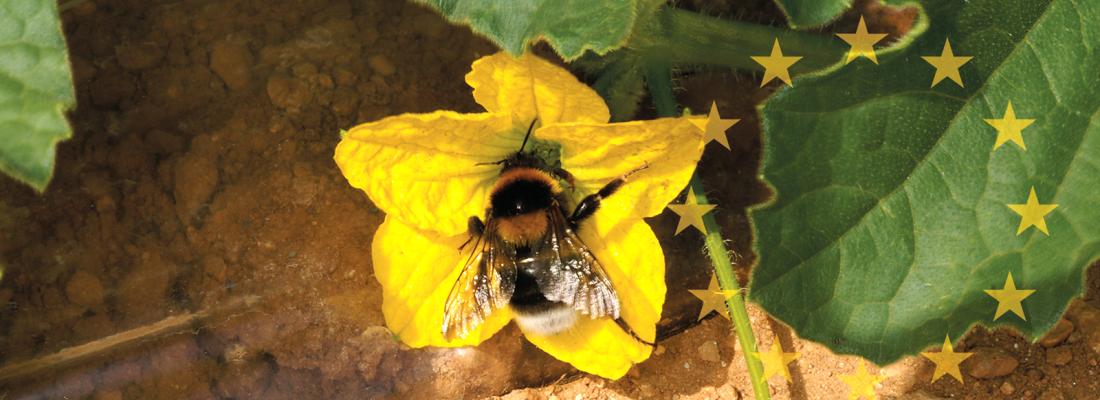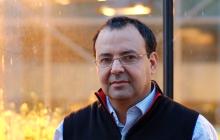Biodiversity Reading time 5 min
Abdelhafid Bendahmane, doubly funded by the European Research Council
Published on 03 April 2023

Domestic and wild insects play an essential role in pollination, thus contributing to equilibrium in natural ecosystems and agricultural systems.
Around 35% of what we eat is the result of insect pollination. Indeed, insects are required for reproduction in 90% of flowering plants, a group that includes fruits (e.g., apples, pears, strawberries), vegetables (e.g., greenhouse tomatoes, melons, zucchini), and field crops (e.g., rapeseed, sunflower). To date, scientists have identified about 20,000 bee species. However, it is estimated that 10% have gone extinct and that others are in the process of disappearing.
Making flowers more attractive
The reliance of our food systems on these vulnerable insects underscores the need to protect pollinators and the effectiveness of their pollination services. This task is essential in a world facing food security challenges. Abdelhafid Bendahmane is an INRAE research director who specialises in flower development and sex determination. Focusing on the above concerns, he has developed a research project entitled NectarGland - Study of developmental, morphological, and chemical cues in relation to bee foraging. NectarGland has just been funded via a European Research Council (ERC) Advanced Grant, the second such award in Abdelhafid’s brilliant career.
The project’s goal is to create a set of tools for making flowers and crop plants more attractive to bees. The idea is to modify plant structure and chemistry to, ultimately, boost the sustainability of yields. NectarGland will explore the molecular mechanisms at play and thereby clarify the long history of co-evolution between plants and pollinators. The resulting knowledge will help us navigate the major global transitions underway, including those involving agricultural systems.
More specifically, Abdelhafid and his team will study how the genetic differences underlying plant structures (e.g., flowers, nectar glands) result in distinct varieties. They will also precisely measure plant characteristics. The objective is to determine whether crops have lost certain bee-attracting traits as a consequence of modern agricultural practices. Then, they will explore whether such traits can be reintroduced.
They will centre their attention on members of the melon family, such as cucumbers, watermelons, and pumpkins. Abdelhafid and his team have long been studying these species, building a vast pool of exploitable knowledge. Paradoxically, these plants can be pollinated by numerous bee species, yet they display low production quality because of poor pollination levels. This issue is of great import because the world's poorest farmers depend on these crops for their livelihoods.
With this award, ERC is honouring the long research path that Abdelhafid and his collaborators have embarked upon. They will put their extensive skills to work identifying the major genes that control plant traits attractive to bees, delve into the development of the nectar gland, and develop a breeding roadmap for varieties that accounts for the agroecological impacts of farming practices.
ERC Advanced Grants provide €2.5 M of funding over 5 years. They are given to established researchers who are leaders in their fields and who propose ground-breaking, high-risk research.
However, Abdelhafid’s success extends beyond NectarGland.
Understanding plant sex determination could improve crop yields
In 2013, Abdelhafid received his first ERC Advanced Grant for a project entitled SexyParth - Unravelling sex determination and parthenocarpy mechanisms to improve crops. The research objective was to describe the mechanisms underlying sex determination and parthenocarpy in plants, with a view to improving crop species. Parthenocarpy is a plant’s ability to produce seedless fruit, that is to say to produce fruit in the absence of fertilisation. This funding allowed him and his team to perform numerous molecular and phenotypic analyses that led to the creation of new plant prototypes.
A couple of patents and publications later, Abdelhafid has built on the foundation established by SexyParth and has just received an ERC Proof of Concept Grant for the project HybridSeed - Sex determination genes as a toolbox for F1 hybrid seed production and yield increase. It is his second award of the ERC 2022 funding season and the third ERC award of his career.
HybridSeed represents an opportunity to explore the potential innovations fuelled by SexyParth’s findings. It also means Abdelhafid’s work will move from the laboratory to the field, where his genome-based discoveries can be validated. He is up to the challenge, which he is tackling with scientific zeal. He is also experiencing a bit of apprehension, given that this new research role will take him to the edge of his comfort zone.
ERC Proof of Concept Grants provide €150,000 of funding over 18 months. They are given to previous ERC laureates, who can then pursue the potential innovations from promising prior project results.
These grants are part of Horizon Europe, the EU's research & innovation framework programme (2021–2027). They are a stepping stone to European Innovation Council (EIC) Transition Projects, which allow for the more extensive exploitation of research results. Thus, the Proof of Concept Grants serve as the link between the ERC and EIC, a relationship that helps boost EU competitiveness.

Mini-CV
57 years old
- Career
2015 Became associate director of the Paris Saclay Institute of Plant Sciences (IPS2)
2005 Became a research director at INRAE
1999 Became a research scientist at INRA
1997–1999 Associate researcher at The Sainsbury Laboratory in Norwich (UK) - Education
1996 PhD in Plant Biology from the University of East Anglia in Norwich (UK)
1991 Master of Advanced Studies in Phytopathology from the University of Paris XI - Awards and distinctions
2023 Advanced Grant & Proof of Concept Grant, European Research Council
2022 Gold Medal, French Academy of Agriculture
2018 INRA Scientific Breakthrough Award
2016 La Recherche Award
2014 Georges Morel Prize, Academy of Sciences
2013 Advanced Grant, European Research Council
2012 Vilmorin et Cie Award
2009 Indian Council of Agricultural Research (ICAR) Award
